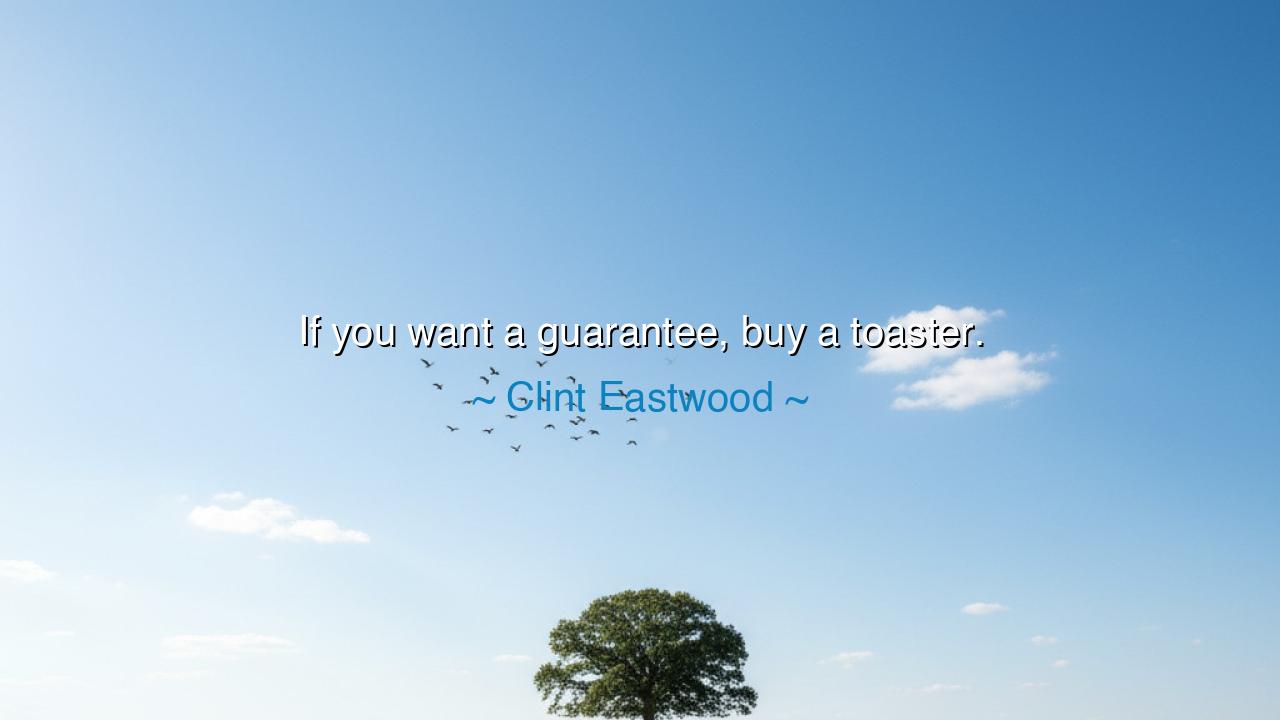
If you want a guarantee, buy a toaster.






"If you want a guarantee, buy a toaster." – Clint Eastwood
In the vast theater of life, where every path is uncertain and every choice carries risk, Clint Eastwood offers a piercingly simple yet profoundly wise observation: the world rarely offers guarantees. His words remind us that true certainty is a rare commodity, and those who seek it in the affairs of life are often disappointed. Only in the most mundane and predictable of objects—a toaster, in Eastwood’s wry illustration—can one expect consistent results. Life, in contrast, is woven with uncertainty, challenge, and risk, and it is precisely in this unpredictability that the human spirit is tested and forged.
The ancients understood this truth well. Heraclitus, the Greek philosopher, famously declared, “The only constant in life is change.” To live, he taught, is to navigate the ever-shifting tides of fortune, circumstance, and fate. The Greeks and Romans alike placed great value on virtue, courage, and wisdom, understanding that guarantees were illusions and that true strength came from the ability to act decisively in the face of uncertainty. Eastwood’s modern insight echoes this ancient wisdom: there are no certainties beyond the most trivial aspects of life. Beyond the simple act of toasting bread, the future is unknowable, and one must be prepared to navigate it with resolve and foresight.
Consider the story of Odysseus, the cunning hero of Homer’s epic. His journey home from Troy was fraught with uncertainty, danger, and seemingly insurmountable obstacles. There were no guarantees of success, and yet Odysseus persisted, relying on his wit, courage, and adaptability. A guarantee, in the sense that Eastwood speaks of it, would have been foreign to Odysseus. The hero’s strength lay not in certainty but in his ability to act decisively despite the unknown, to take calculated risks, and to endure hardship with resilience. Similarly, Eastwood’s quote reminds us that life’s great adventures, the ones that carry meaning, rarely come with the safety of a guarantee.
History is rich with examples where those who sought certainty failed to achieve greatness. Consider the explorers of the Age of Discovery—men like Christopher Columbus or Ferdinand Magellan—who ventured into uncharted waters. They could never be guaranteed safe passage or success. Many perished; many were lost. Yet it was precisely their willingness to embrace uncertainty that allowed them to expand the boundaries of the known world. In contrast, those who sought the safety of the familiar, those who desired a life free of risk, often remained unnoticed, their potential never realized. Life offers no toasters, no simple guarantees, but it offers opportunity to those who are willing to embrace the unknown.
The wisdom in Eastwood’s words lies also in the acceptance of imperfection and failure. Life is not a machine that operates under predictable rules, as a toaster does. It is a dynamic, living process, where outcomes are shaped by countless forces, many of which are beyond our control. The stoics, such as Epictetus, taught that true freedom comes from recognizing what is within our control and what is not. We cannot guarantee the future, nor can we ensure the outcomes of our efforts. What we can do is act with integrity, skill, and courage, accepting the uncertainty as part of the human experience. Eastwood, with his characteristic brevity, reminds us of this essential lesson: if you seek certainty, you are seeking it in the wrong place.
Even in the modern era, this truth resonates. Entrepreneurs and innovators, from Steve Jobs to Elon Musk, have embraced ventures with no guarantee of success. Their paths were riddled with risk, uncertainty, and failure. And yet it was precisely their willingness to accept uncertainty that led to groundbreaking achievements. Jobs’ journey with Apple, fraught with near-bankruptcy and setbacks, required the courage to act without guarantees, to innovate despite the unknown. Eastwood’s simple analogy of the toaster underscores this reality: if one desires certainty above all else, one will never step into the realm of transformative action.
The lesson in Eastwood’s observation is both humbling and empowering. We must release the illusion that life can offer guarantees beyond the trivial. Instead, we are called to cultivate resilience, judgment, and courage, embracing risk and uncertainty as the soil in which greatness grows. Life rewards those who act decisively despite ambiguity, who take responsibility for outcomes that cannot be promised or predicted. The toaster is a symbol not of futility, but of perspective: some things in life are simple and predictable, but the grand endeavors of human existence require boldness in the absence of certainty.
Let us then walk boldly into the unknown, understanding that guarantees are the exception, not the rule. Let us embrace the wisdom of Clint Eastwood, the ancients, and the great pioneers of history: to live fully, one must act despite uncertainty, to pursue meaning even when outcomes are not assured. Life’s richest rewards—the creation of art, the forging of knowledge, the building of civilizations—come not from the safety of guarantees, but from the courage to venture into the unpredictable, trusting in our skill, our vision, and our capacity to endure. Only then can we transform the unknown into a world of possibility.






AAdministratorAdministrator
Welcome, honored guests. Please leave a comment, we will respond soon